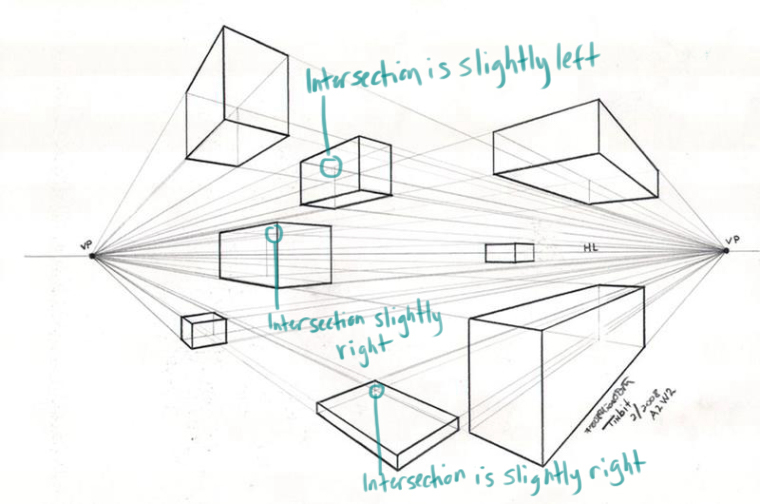How to Draw Everything: 2 point perspective question & feedback requested
-
@bichonbistro Ok, first I want to say that I think you've done a pretty good job with the perspective here. It looks like the concepts are starting to sink in by the way you are placing your details and forms and also the shadow angle in the doggie piece.
I think with the SVS bunny, giving it a little more space, especially below it, would go a long way with the illusion that we are looking up at it. I think that the way you've drawn the pose and angle of the bunny is successful overall.
I think you've done a good job with the doggie as well, it's just that the pose may not work with the perspective you've chosen. You may have to tweak the pose, the perspective, or both until it looks right. Sometimes you can make things incorrect if it looks better (For example, maybe adding a shoe to that back foot would make it look more "right" even if it's technically wrong).
It can be frustrating knowing exactly how to apply perspective to a working method. I think it's different from artist to artist. I'm still personally trying to figure things out, and my methods change all the time.
My short answer, for now, on how I'd personally approach these drawings is that I would not bother with horizon lines, unless I was adding in more rigid structures like architecture and perhaps some landscape features along with them. If I did want to figure out the horizon line for some reason, I would make very small thumbnails and play around with the horizon lines and vanishing points, and use that as a reference for my final piece- remembering that for both of these drawings, the horizon line would likely be out of the picture plane. For the bunny I might use a single vanishing point, somewhere above it's head and place a cylinder or a rectangular plane, vanishing to that point as a rough guide. With the doggie, it would just take a lot of tweaking between angle and pose, so that things read well. Sometimes the pose and the angle don't mesh well, so you have to tweak and maybe cheat things to get it to work.
For both drawings, I might look at photo reference, use one of my kid's toys, or make a rough model out of clay to figure out how things overlap and how much you see of certain things like legs and arms. In some instances, I've gone into sketchup and loaded a 3d model from the database, and play with the angle and zoom lenses to see what's going on. Sometimes I draw a rough idea of the pose in a couple of different angles, and see how it relates to the ground plane, so I then know where to place the legs- which would be applicable to the dog drawing. It's been an eye-opener for me to see artists, who seem comfortable with perspective, still using help like photo reference and Maquettes to help them along with character poses and angles.
Sorry if that was confusing- I just wanted to stop in, so you know I read your reply. Inktober is taking up most of my art time, so a better explanation, examples, and study suggestions will have to wait until later, unless someone else jumps in. For now, I would be proud! These kinds of angles are tricky and I think you are understanding more than you may think.
-
@tessw thanks so much--I have been blown away by your creation of a storyline to expand the inktober prompts, so I totally understand how that is taking up your time. It's so kind of you to reply in the midst of inktober.
I have never heard of "sketchup" or "maquette" (though I had unsuccessfully tried making a mini model with my kneaded eraser
 ), so I have additional aids to investigate, thanks.
), so I have additional aids to investigate, thanks.I really wanted to put tall buildings in the bunny picture, so I would have needed to identify the horizon line to connect the 3rd vanishing point above the bunny to that line. Through thumbnails I realized I just wasn't getting it.
I will go back to find photos with the point of view and angles I am trying to achieve, then try to identify the horizon and vanishing points in those photos. I just noticed procreate has a perspective aid--maybe I can import those photos and see if procreate guidelines clarify things.
As I understand it, any time I introduce a plane at an angle (the doggie turned vs facing forward), it requires 2 point perspective.
I keep thinking of Will's penguins at all different angles and locations in relation to the horizon and I want to be able to do that! But I think I need to step back to 1 point perspective and try the doggie facing front to see if I can achieve drawing it on a horizon line, above, then below it.
Thanks for the guidance and encouragement--I am a slow learner so I will be working on this well after inktober ends!
-
Hi Patty, I know that this wasn't your newest question, about how to apply perspective to your figures, but I thought these would be helpful. It's basically showing how you can use one point perspective to put in buildings for extreme perspective. I think your bunny was working well as you drew it, so I just wanted to show you how you could add in the buildings.
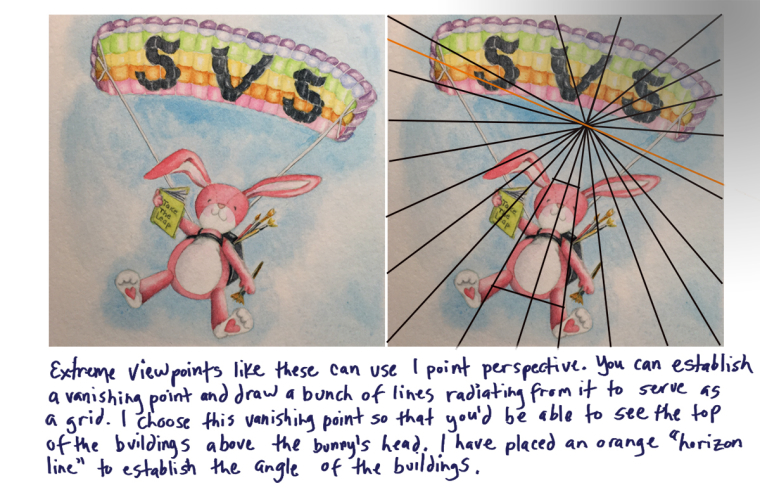
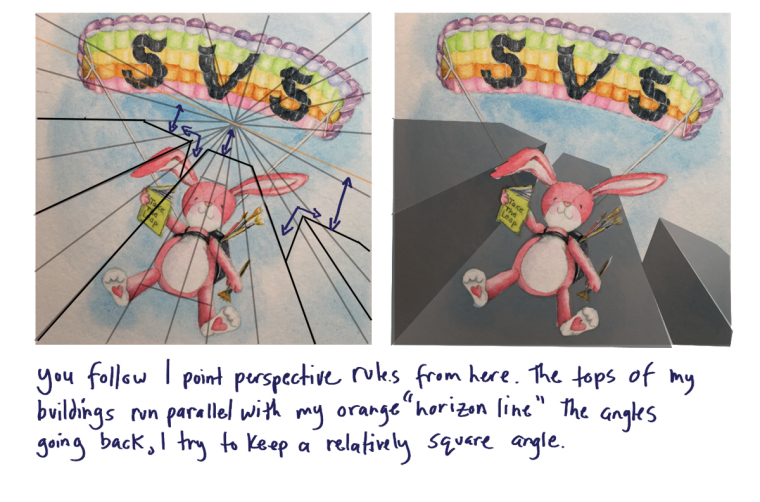
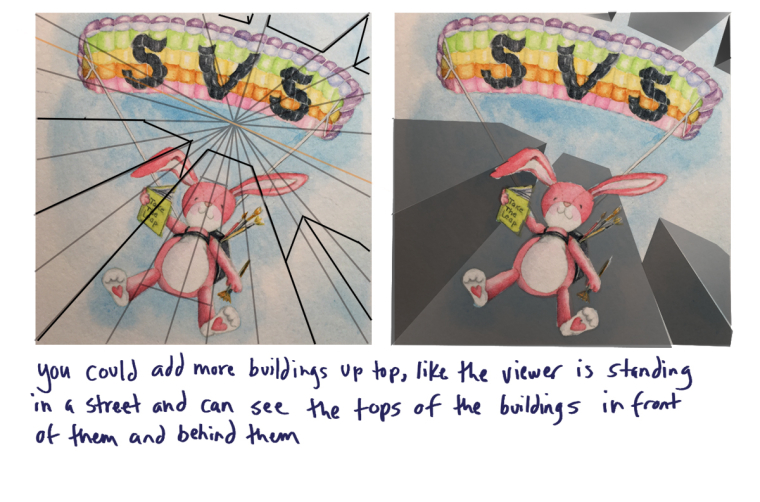
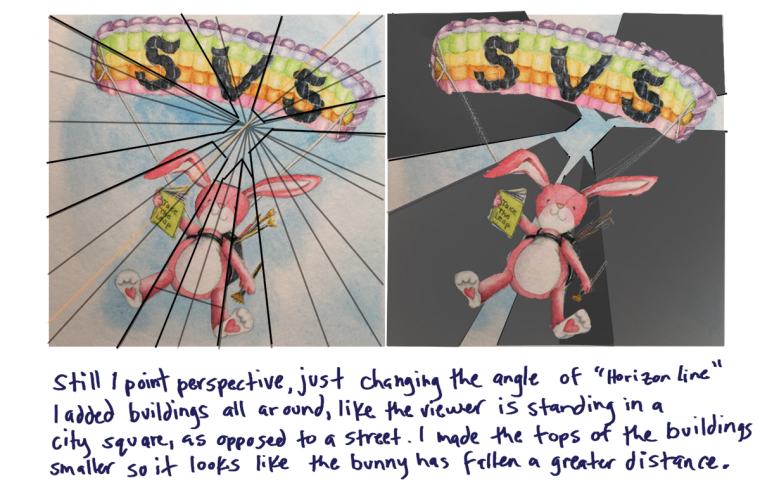
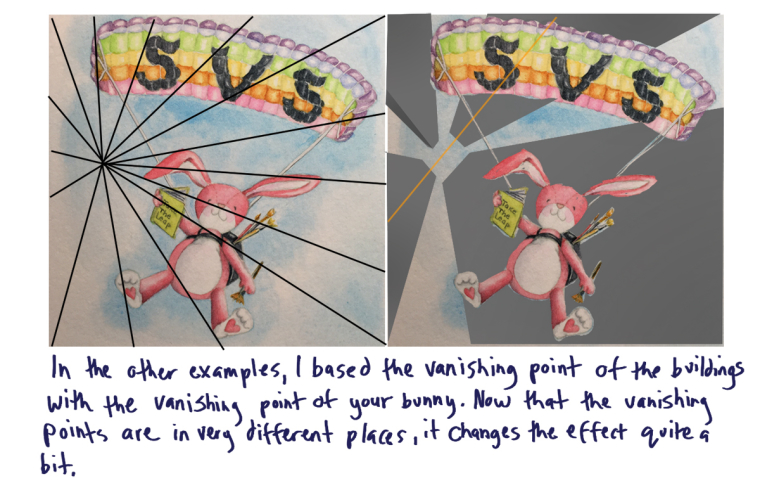
As far as using perspective knowledge for placing figures in extreme angles, I'm working on something for you right now. In the meantime, however, I think the biggest thing is being comfortable with drawing cylinders, cubes, and spheres. It takes a lot of practice to get comfortable. Working through "Fun with a Pencil" by Andrew Loomis will definitely help you be more comfortable with that. Here's a couple of good videos to watch.
https://www.ctrlpaint.com/videos/simplifying-form
https://www.youtube.com/watch?v=eFKMw8YekFY
Here's a couple of sheets with concepts that are good to know for drawing figures in perspective:
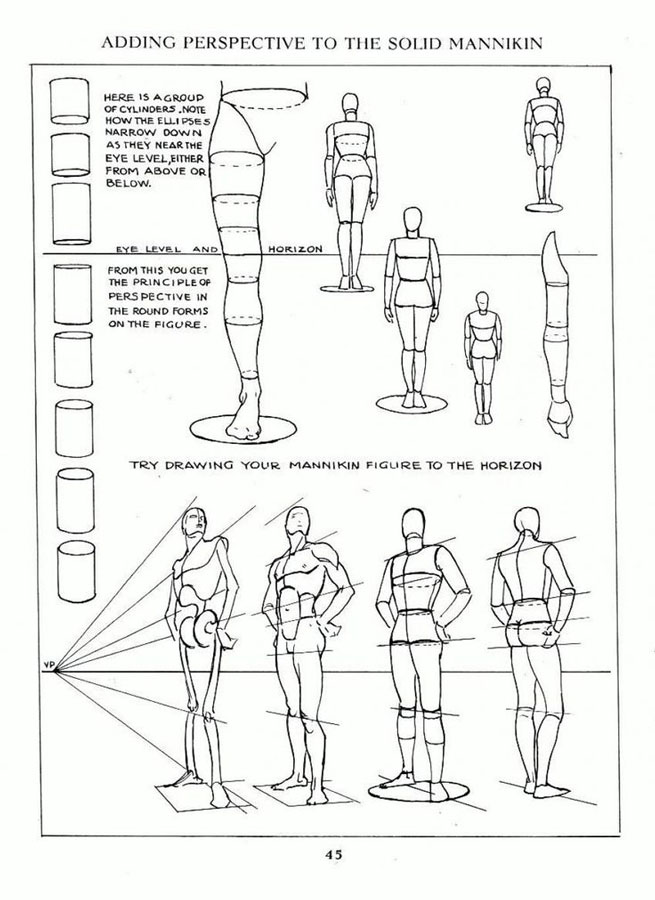
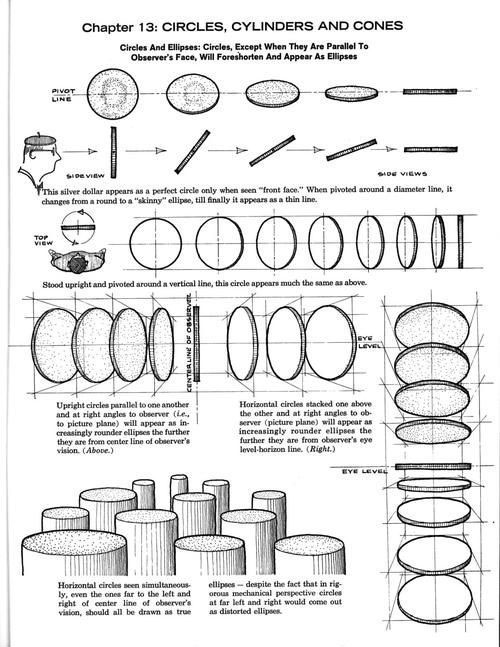
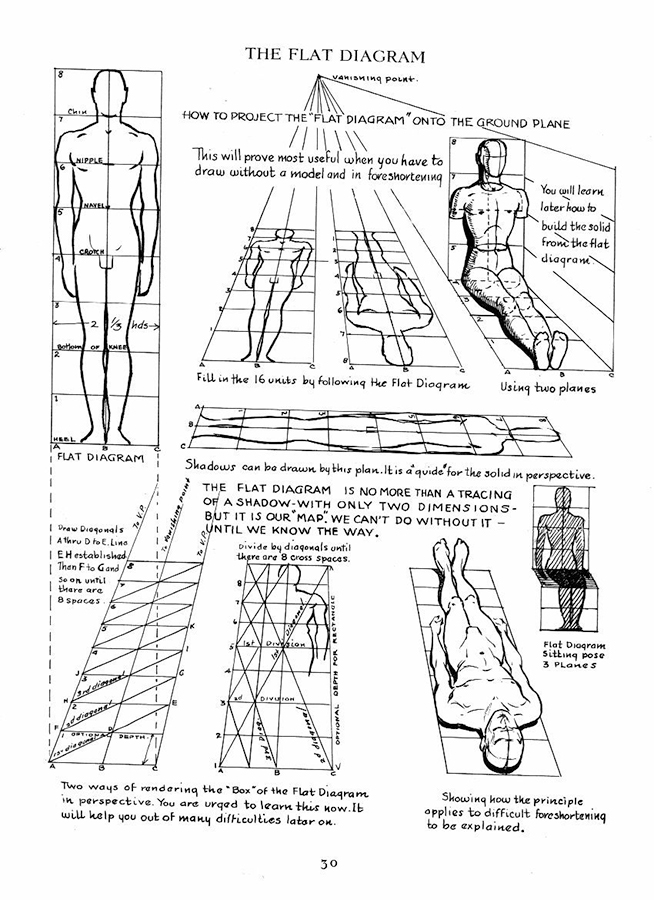
I'll compile additional resources I have studied from later.
-
@tessw oh my gosh Tess, you are a phenomenal resource!! I really feel SO thick-headed on basic concepts like horizon and point of view--I had no idea that what I was visualizing in my head as 3 point perspective was really 1 point perspective...boy do I have a ways to go, but I am recognizing things in Loomis's worksheets that correspond with what Will says in the Visualizing Drawing in Perspective (I went to that course first hoping I could "cheat" my way into understanding and drawing in perspective ha!). Thanks so much for all the encouragement and help on this. Your overdrawings with the perspective lines and buildings help me see what I could not see when I was trying to incorporate tall buildings on my own. I am committed to understanding and applying these concepts no matter how slow I am to get it. That commitment is progress for me because I usually become frustrated and give up, so thanks ever so much!!!

-
No problem!
Actually, you could use 3 point perspective for buildings in this scene, as well. Just like in more conventional compositions you might use 1 point for some scenes and 2 points in other cases. I just wanted to show you that you could use 1 point for a situation like that. I use that radiating pattern for a lot of up shots- and don't necessarily think of it as 1 point or 3 point perspective. It acts as a helpful guide, especially for things without corners or noticeable angles, like trees, or poles, or that cavern scene in my Inktober series. 3 point is not as scary as it seems, especially after you understand 2 point, so I'd encourage you to study it some time.
Just keep at it, keep doing drills, and learning from different sources if it helps. I've been learning perspective for awhile now, and it's still confusing and hard at times, but it does start to be more intuitive after awhile.

-
@tessw I got "Fun with a pencil"
 Thank you for that reference--this quote at the end really resonates, especially as it applies to perspective: "Lack of knowledge can be greater torture than the effort of acquiring it"
Thank you for that reference--this quote at the end really resonates, especially as it applies to perspective: "Lack of knowledge can be greater torture than the effort of acquiring it" 
-
Right on! Good quote. I love Fun with a Pencil because it helps build really useful skills but it feels less intimidating than other sources.
-
Hey, I wanted to address what was said about fudging the back corner of a box. There should be no need to fudge it at all. The back verticals will alwasy line up perfectly. The cool thing about perspective is that you can measure and you don't have to guess. That doesn't mean you get a free pass. Compostion, design, and all the other "art" stuff still has to be figured out...
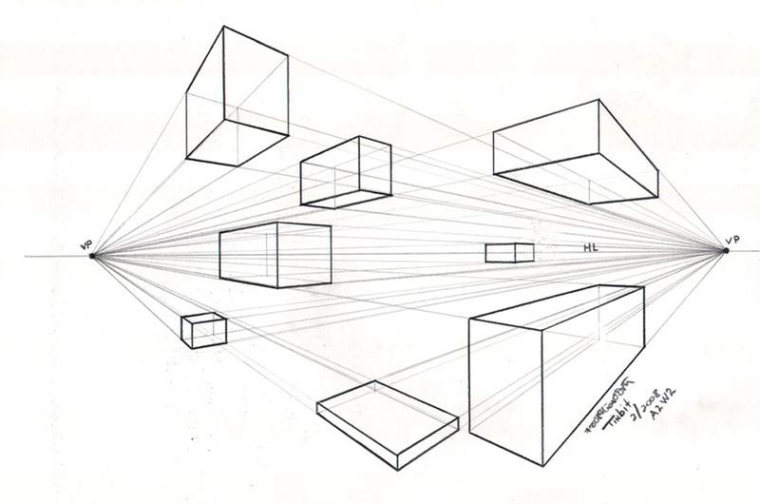
-
Here's another tip, if you are struggling to draw/understand perspective, stop trying to do it from scratch. Make it a practice to draw using a photo and try to understand the perspective. You can use buildings or people, or whatever. Just grab a bunch of photos and try to make sense of it. Then you can use the photo perspective as a base to build your drawing from. THis makes it much easier and you will learn it very quick. I'm not sure why perspective isn't taught this way in school. Doing this simple exercise for a month would clear up almost every question you have about perspective.
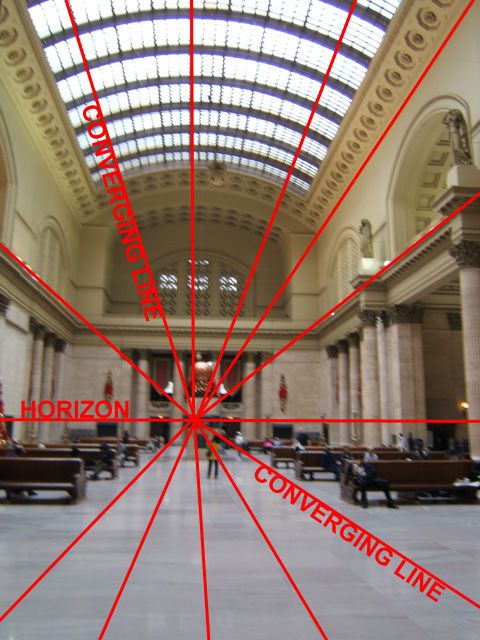
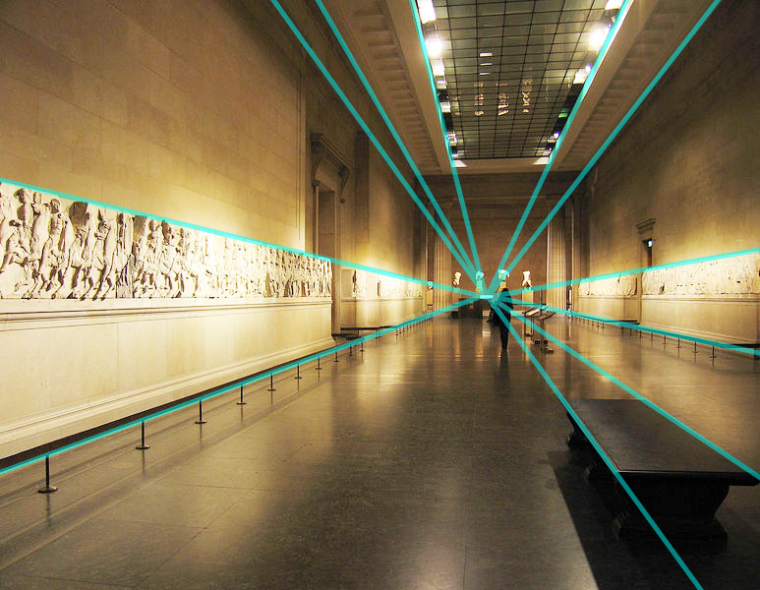
-
@lee-white Holy cow, what an obvious, and easy, exercise. Very helpful!
-
@lee-white I've always found it notoriously difficult to get those back corners to line up perfectly, even when I'm trying to be meticulous. In the example you posted, I can see where a couple of those back intersections aren't quite aligned with each other and the artist has placed that back corner nonetheless. Maybe I'm missing something, but that's what I consider fudging it- getting it very close, so it looks correct but not quite as close as a computer would. Am I wrong?
-
@tessw Can you show me where you are seeing the fudging the back corner in the example?
You shouldn't have to fudge it because it's basically math. What is probably happening with your drawings is that your grid isn't exactly right. maybe the lines don't go perfectly to the point on the horizon line, etc. That will cause a little shift in the perspective grid.
Using a perfect 2 point grid like I have here, It should line up perfectly every time.
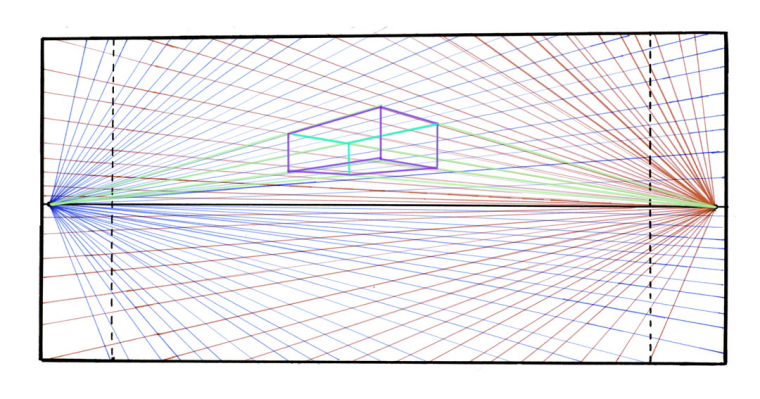
BTW, It really doesn't matter too much if it's perfect, as long as it looks right (as you mentioned). I just wanted to clarify that the math does work out to place that back corner if the grid and object are drawn correctly. Either way, it should never be as slanted as that drawing earlier in this post. Something went very wrong there.
-
Here's another way to think about it. You should be able to draw the back box first and it would work out to be correct too. Since it's math, starting at any side should still show the same results. Here's a box where I built it from the back wall first...
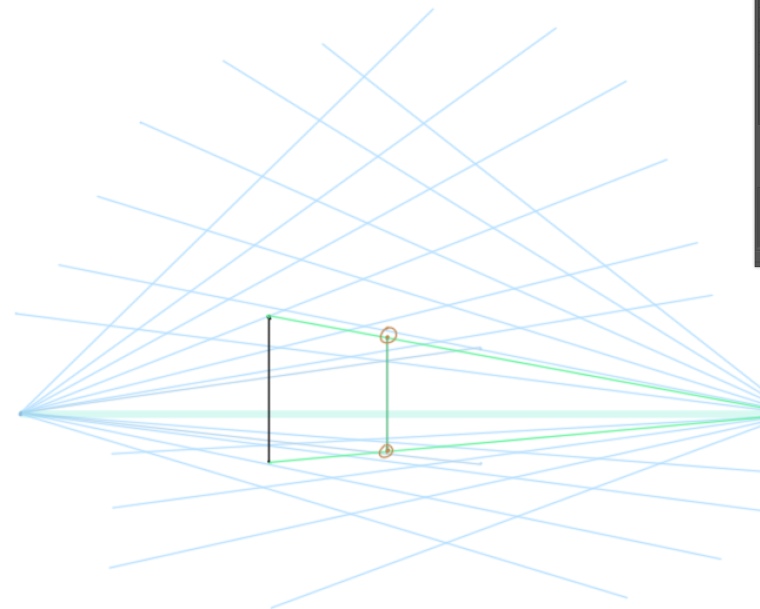
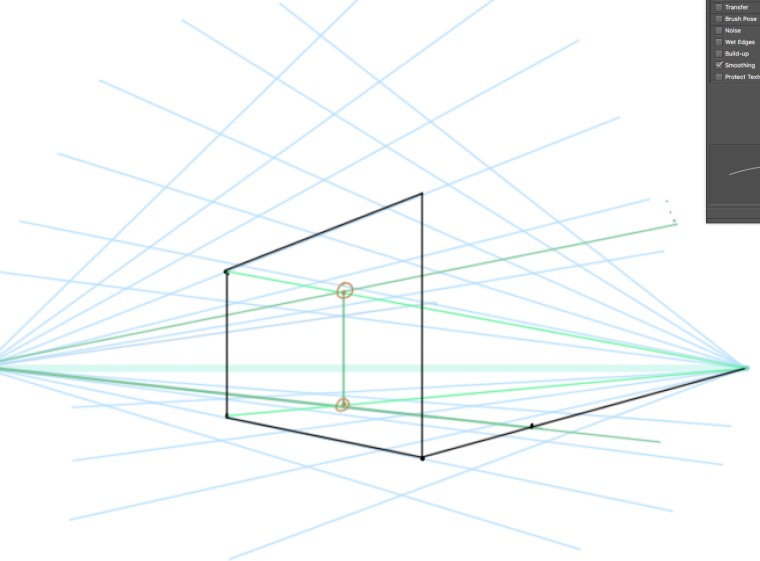
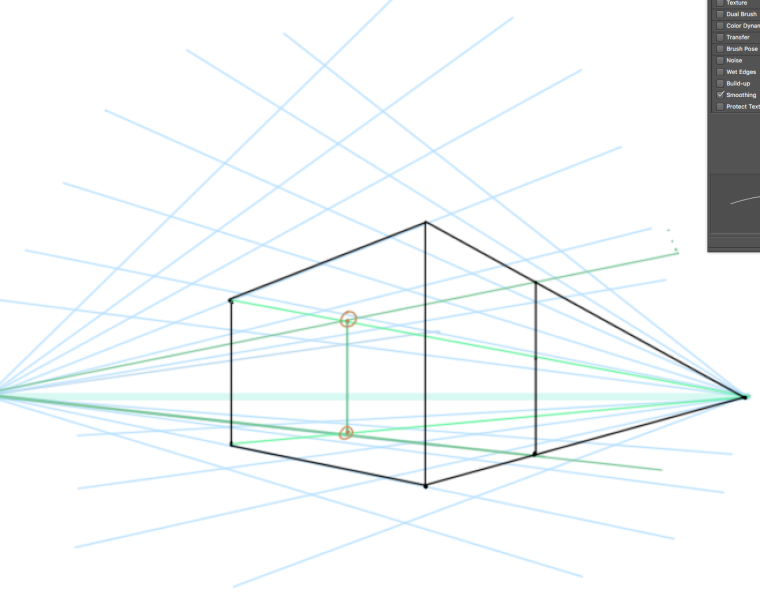
-
Using your drawing, I cleaned up the lines to the vanishing point, which causes the back to become correct again.
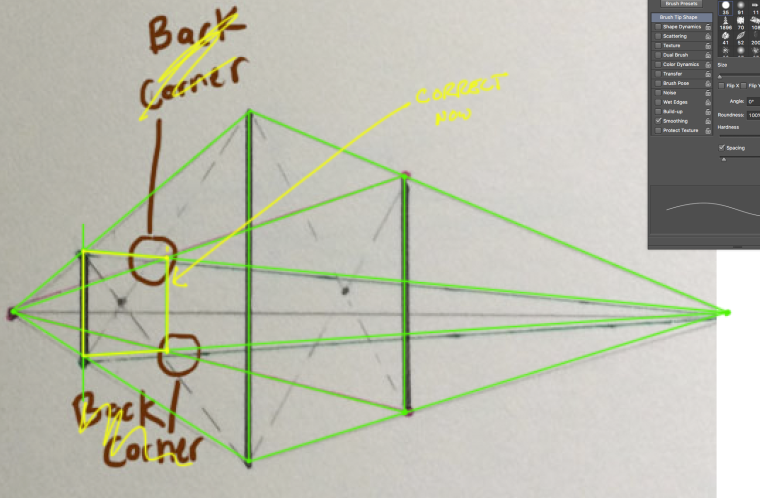
-
I've pointed out the areas where the intersections are off to me. I've done a lot of these myself using grids, and the results are very similar to the ones you posted. Some I can get "perfect", but with many the intersections are slightly offset and my straight vertical back corner doesn't quite hit dead center with both intersections, because even a small error of angle in any of the four vanishing lines affects it. It's even more obvious when you are zoomed in a bit while constructing these boxes. It always sort of bugged me, but after watching some perspective videos on svs where the tone is more relaxed, I figured it wasn't really all that important- hence my "fudging it" point of view. However, I don't want to encourage anyone to settle for less than what they are capable of, so maybe my advice was not appropriate. I just understand the frustration of feeling like you are taking time to do everything right, but still not quite hitting accuracy well enough.
On another note though- I will second the exercises overlaying the perspective lines on the photographs. Those were super helpful to me. After getting comfortable with these, at some point it might also be helpful to find photos with characters or objects in them and draw bounding boxes around them.
-
@lee-white the original drawing where the perspective is off and you did the overlay in yellow is my attempt to do the 2 point perspective exercise in "how to draw everything". I did that drawing freehand, but I recently learned the concept of a perspective grid and that procreate has that facility.
To make sure I understand what caused the problems with the freehand attempt--is it primarily the failure to accurately connect the red converging lines to the vanishing point on the left?
I have stepped back to using photos to identify vanishing points and horizon lines, but honestly have not found it that easy to visualize cubes in 2 point perspective with photos that consist mainly of people, even when I upload those photos into procreate and try to create a grid.
You used the word "math" quite a bit, sparking an immediate brain freeze--is it possible for those who are terrible in math to learn and apply perspective?
-
@bichonbistro haha, sorry for using the "M" word! It's not really math, but what I mean by that is that it's based on measurable things. In other words, it's not based on subjective things like other areas of art. If you make vanishing points that are correct, a box will work every time. So you don't really need "math" per se, but just take confidence that there is a consistent logic behind it.
If the perspective is off, it just means that something happened along the way that wasn't placed correctly. If the lines don't go back to the vanishing point cleanly, it will throw it off. Again, its not like you will get busted by the perspective police if you mess up here and there. I just wanted to show that the "fudging it" factor is not needed if the lines are correct. It's important to learn it correctly. But then throw that sucker away and draw cool stuff. No one has ever said "I hate that drawing, but man the perspective is exactly right!". There are people who will call you out on every little vanishing point, but those people don't see the forest for the trees.
Now, when doing the photo exercise, do NOT use photos of mainly people. People are almost useless in this. Use architecture and buildings, cars are good to so you can figure out how to box them out. For people, I just think about whether I'm drawing them from above, at eye level, or from below and let the perspective work out from there. After doing this professionally for the past 15 years I have never used vanishing points for a figure.
Hope that helps some. Good luck!
-
@lee-white Whew, thanks for avoiding the M-word
 isn’t it funny that the word “logic” is less threatening, even though that’s a subset of math?!
isn’t it funny that the word “logic” is less threatening, even though that’s a subset of math?!It is a bit intimidating to see how a very slight variance in line placement at vanishing points can so throw off perspective. I appreciate the clarification that while it is important to accurately learn the principles of perspective, don’t avoid drawing out of fear of the perspective police

Thanks for the advice to NOT use photos that consist primarily of people in trying to learn perspective—I was getting frustrated by that. I feel like I can breathe again knowing that I don’t need to precisely fit every character in a box in perfect perspective with heights accurately measured along converging lines when attempting to construct a scene with characters in it. It is very reassuring to read that you’ve never used vanishing points for figures in 15 years

I appreciate the help and encouragement from @TessW and you to finally learn principles that I have avoided for years. I keep telling myself it’s necessary to make a lot of mistakes to learn, but boy it’s hard to make marks knowing they are not going to match what is in your mind’s eye.
-
@bichonbistro said in How to Draw Everything: 2 point perspective question & feedback requested:
visualizing drawing in perspective
Thank you guys for the great support you are giving on this thread! Much appreaciated!
I'm doing currently the online course "Learn how to draw everything".
I understand the whole concept of the 2 point perspective.
When i draw a cube or a box with a ruler, the horizon and the guide lines its "easy" for me.
But when i start to draw cubes in perspective freehand, its giving me a hard time.Do you have any tipps on drawing cubes/boxes in perspective freehand?
Thank you,
Fritz
